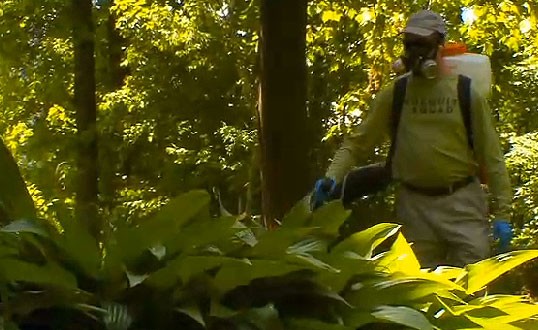As one of those lucky people generally ignored by stinging and biting insects, it was dismaying a week or two ago to be covered in itchy red welts after just a little while outdoors planting flower pots. A few days later the graveside rites at a funeral I attended were actually cut short as mourners slapped, scratched, muttered and finally fled – with the full blessing of the officiant — the buzzing swarms seeking fresh blood.
In other words, this year is a bad bug season for anyone whose community isn’t paralyzed with drought, and as CBS affiliate WCCO in Minnesota reports, that means “Mosquito Squad Business Booms.”
That story refers to the type of service that sprays residential properties to combat mosquitos; you also could look into the companies that spray on behalf of municipalities or large commercial operations like theme parks, golf courses etc. Here’s a just-out National Geographic piece, “Hitting mosquitoes where it hurts,” about the tactics of large-scale skeeter control. Ask state and local officials about spending on mosquito control by your state, county or municipality.
Like any industry, there’s a trade group for this: the American Mosquito Control Association offers a lot of industry info on its website (Mosquito Awareness Week is coming up June 22-28) and likely can direct you to local members. What are they seeing this year in terms of demand, consumer spending, employment and so on? Many of these operations appear to be franchises; I got one of those coupon packs in the mail the other day with several ads for local outlets of national chains. Is it a good or growing franchise opportunity?
Mosquito-borne diseases are of concern this year, with even dengue fever showing up in Florida. Talk with local public health officials about West Nile threat and other disease concerns; the Centers for Disease Control and Prevention offers more info on its site.
Even with the need for disease control, many people are uncomfortable with widespread use of killing chemicals; you might want to talk with your state’s agriculture department and other regulators, as well as university etymologists, environmental advocates and others about how pest-control firms are regulated, what’s in the chemicals used, what the spraying does long-term to insect mutation and to human beings. What about people with chemical sensitivities or respiratory illness; how do public venues such as ball parks accommodate these patrons, if at all?
Ask hardware stores and other retailers about sales of insect-repellant products, most of which contain DEET – here’s a recent Popular Science article on that chemical’s safety and efficacy.
You might check out healthy-living shops for alternatives to DEET-based preparations, like live citronella plants, candles, wristbands, herbs, anti-bug soaps and the ever-popular lore that wearing a scented dryer sheet will repel biting insects. Blowing fans are another eco-friendly way to keep the bugs at bay, if you’re doing a factbox.
Don’t forget about pets, too – are vets seeing an uptick (pun intended!) in demand for protective potions for dogs and cats? Or worse, an increase in heartworm and other maladies caused in animals by insects? And what do commercial livestock growers do to protect their animals from suffering and disease?












